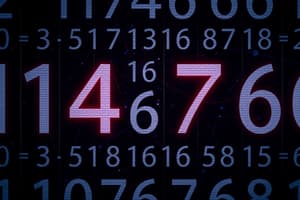Podcast
Questions and Answers
All whole numbers are also natural numbers.
All whole numbers are also natural numbers.
False (B)
The number $2$ is a composite number.
The number $2$ is a composite number.
False (B)
All rational numbers can be expressed as either terminating or repeating decimals.
All rational numbers can be expressed as either terminating or repeating decimals.
True (A)
Irrational numbers can be expressed as a fraction of two integers.
Irrational numbers can be expressed as a fraction of two integers.
The process of breaking down a number into its prime factors is called factorization.
The process of breaking down a number into its prime factors is called factorization.
Flashcards
Natural Numbers
Natural Numbers
Counting numbers (1, 2, 3, ...)
Whole Numbers
Whole Numbers
Natural numbers plus zero (0, 1, 2, 3, ...)
Integers
Integers
Whole numbers and their opposites (-3, -2, -1, 0, 1, 2, 3, ...)
Rational Numbers
Rational Numbers
Signup and view all the flashcards
Irrational Numbers
Irrational Numbers
Signup and view all the flashcards
Real Numbers
Real Numbers
Signup and view all the flashcards
Prime Numbers
Prime Numbers
Signup and view all the flashcards
Composite Numbers
Composite Numbers
Signup and view all the flashcards
Terminating Decimals
Terminating Decimals
Signup and view all the flashcards
Repeating Decimals
Repeating Decimals
Signup and view all the flashcards
Factorization
Factorization
Signup and view all the flashcards
Study Notes
Number Systems
- Natural Numbers: Positive whole numbers (1, 2, 3, ...)
- Whole Numbers: Non-negative whole numbers (0, 1, 2, ...) - Includes natural and zero.
- Integers: Positive and negative whole numbers. (..., -3, -2, -1, 0, 1, 2, 3, ...) - Includes whole numbers and negatives.
- Rational Numbers: Numbers that can be expressed as a fraction p/q, where p and q are integers and q is not zero. - Includes terminating and repeating decimals.
- Irrational Numbers: Numbers that cannot be expressed as a fraction and have non-terminating and non-repeating decimals. - Examples include π (pi) and the square root of 2.
Real Numbers
- Real numbers include all rational and irrational numbers.
Prime and Composite Numbers
- Prime Numbers: Whole numbers greater than 1 that have only two factors: 1 and themselves. Examples: 2, 3, 5, 7.
- Composite Numbers: Whole numbers greater than 1 that have more than two factors.
Decimal Types
- Terminating Decimals: Decimals that end after a finite number of digits. Examples: 0.5, 2.75, 1.2
- Repeating Decimals: Decimals that have a repeating pattern of digits. Examples: 0.333..., 0.121212...
Non-Terminating and Non-Repeating Decimals
- These decimals represent irrational numbers. Examples include π and √2.
Factorization
- Factorization is the process of breaking down a number into smaller numbers that multiply to the original number.
Studying That Suits You
Use AI to generate personalized quizzes and flashcards to suit your learning preferences.




